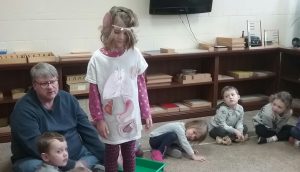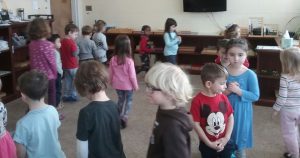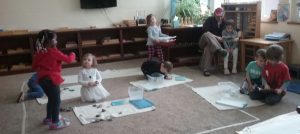Line Time:
This week we learned about Internal Organs. We learned the brain is the control center of your body that sends and receives. Our lungs help us breathe, the heart pumps our blood and the stomach begins to digest our food with acid. The small intestines digest the food and send nutrients to the rest of our body and the large intestines push through the waste that creates our bowel movements (poop). The children were fascinated that our kidneys process the body’s water and the liver filters toxins, that’s why is important to take lots of water, even when you’re not home. The waste water is called urine (pee). The children learned where the organs are located with the help of our Living Internal Organ T-shirt. The shirt helped the children find the organs location by velcroing the organs to the spot on the t-shirt.

Cultural Subjects:
Your children can now count to ten in 19 languages (English, Latin, Sign Language, Spanish, German, French, Japanese, Greek, Arabic with the Lebanese Dialect, Italian, Russian, Romanian, Swedish, Tagolog, Hebrew, Korean, Hungarian, Irish, Kiswahili).
Peek In Our Classroom:


Next Week:
Line Time- Pollution/Recycling
Letter Of The Week- S s
Rhyming Word Of The Week-bup
Next Language will be- Welsh
Snack will be brought to you by Ever
Upcoming Events:
<<<<<<<< All School Dance February 9, 2:00 pm – 4:00 pm >>>>>>>
(((((((((((( Open House February 24, Sunday 2pm to 4pm )))))))))))
—–Valentine Day Party- Friday February 15th follow the link for the information—–
https://www.signupgenius.com/go/4090b48a8a92da6f94-mrjohns8
***** Bring Your Parent To School ***** follow the link to sing up
https://www.signupgenius.com/go/4090b48a8a92da6f94-mrjohns9
—–Recess attire…. winter coat, hat, gloves or mittens that are waterproof (not cloth or yarn), boots, and snow pants!
If the child does not have one or all of these items they may be asked to stay in.
Fun, Frolic, and Friends:





